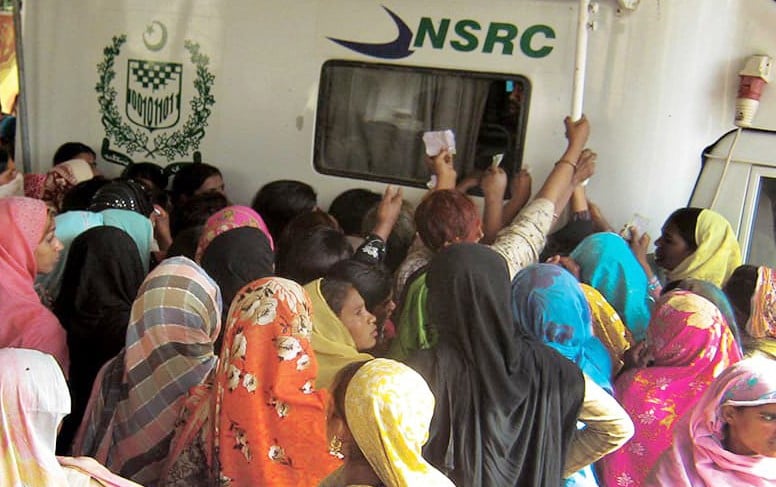
For many women in KP and other provinces, getting a CNIC is still asking for the moon

Not only the women of remote, conservative areas of Pakistan, but even those in urban and suburban localities are deprived of many of their basic rights. The number of women in the parliament, in offices, trade centres, schools, colleges, universities and in other public sphere is much fewer than men.
Lack of education and cultural barriers are some of the key reasons that don’t allow women to come at par with men. A huge number of women, more than 12 million, don’t possess their national identity cards, a basic requirement for getting facilities and rights as citizens of this country.
For not having computerised national identity cards (CNICs), millions of women do not cast their vote in remote and even urban towns as their names do not get enrolled in the voters’ lists.
A report compiled recently by Tabeer, an Islamabad-based organisation, hinted that the ratio of female voters against 100 male voters has further reduced from 77.8 in 1970 to 77.7 in 2008, a matter of concern for all those who were making efforts to increase the participation of women not only in the electoral process but in every other field.
A majority of women in rural areas do not have CNICs because they are not aware of their rights and they have no access to Nadra centres.
Other reasons include lack of interest in getting a CNIC as they don’t need it since they do not go to school, college or apply for any job, etc.
"We are a patriarchal society and woman face a lot of barriers on their path to becoming equal human beings. Theoretically, every citizen of the country is entitled to a CNIC but practically it’s not easy for women, in particular, to get this right in far flung areas," says Afrasiab Khattak, a senior politician and former chairman of the Human Rights Commission of Pakistan.
Read also: By the numbers
"This is a definite roadblock when it comes to work, travel or having property. Culture is a dynamic phenomenon and it changes for the better but, unfortunately, we have witnessed cultural regression that has negatively impacted woman’s right to mobility," adds Khattak.
"My CNIC expired a few years ago. I went to the office of a local nazim where a Nadra mobile team had come to issue CNICs to women. However, I and many other women were told to visit the Nadra office. I haven’t been able to renew it since then for lack of access," says Naila Khan, who comes from the suburbs of Peshawar.
She suggests that there should be all-women staff at a few Nadra offices where illiterate rural women can also go to get their CNICs, "I never needed my CNIC except for two elections held in the past. This is probably why I didn’t turn up for renewal of my card later," she adds.
Women voters of two villages in Khyber Pakhtunkhwa’s Shangla district were deprived of their right to vote in by-elections in May this year. By-elections were held to fill 43 vacant seats in 40 village councils in 14 districts across the province. The seats had fallen vacant after elected councillors had taken government jobs. The ban was reportedly imposed by the locals "according to their culture".
A number of measures have been taken by the federal and provincial governments in recent years to empower women and to give them equal rights. Most of the measures, however, have only proved to be an eyewash.
A resolution was submitted by a female lawmaker in the KP Assembly last month to provide CNICs to all the women in KP in an easier and convenient way.
A female lawmaker from Khyber Pakhtunkhwa, Meraj Humayun Khan, told the media after a meeting recently that around two million women in the province were without a CNIC. She was of the opinion that Nadra and other government agencies must make all-out efforts before the general elections next year to issue CNICs.
"There are many remote areas of KP, Fata, Balochistan, Sindh and Punjab where women don’t have CNICs. The government should involve lady health workers, female teachers and others to carry out a door-to-door campaign, take the Nadra verification machines to these people and issue them CNICs at their doorsteps or at the nearest place," suggests Mussarrat Ahmadzeb, Member of the National Assembly from PTI. She has recently founded the first ever Swat Women Chamber of Commerce as its first president.
Special campaigns in areas like Dir, Kohistan, Tank, Fata and other restive areas will help women get CNIC as well as their right to vote. "Not only these women are deprived of their right to vote but not having a CNIC deprives them of their right to get a job, a passport, or a bank account and other facilities," she adds.